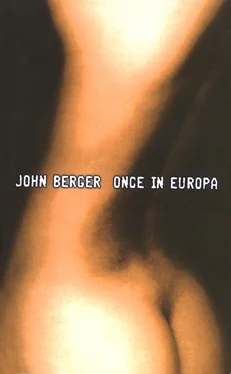John Berger - Once in Europa
Здесь есть возможность читать онлайн «John Berger - Once in Europa» весь текст электронной книги совершенно бесплатно (целиком полную версию без сокращений). В некоторых случаях можно слушать аудио, скачать через торрент в формате fb2 и присутствует краткое содержание. Год выпуска: 2014, Издательство: Bloomsbury Publishing, Жанр: Современная проза, на английском языке. Описание произведения, (предисловие) а так же отзывы посетителей доступны на портале библиотеки ЛибКат.
- Название:Once in Europa
- Автор:
- Издательство:Bloomsbury Publishing
- Жанр:
- Год:2014
- ISBN:нет данных
- Рейтинг книги:3 / 5. Голосов: 1
-
Избранное:Добавить в избранное
- Отзывы:
-
Ваша оценка:
- 60
- 1
- 2
- 3
- 4
- 5
Once in Europa: краткое содержание, описание и аннотация
Предлагаем к чтению аннотацию, описание, краткое содержание или предисловие (зависит от того, что написал сам автор книги «Once in Europa»). Если вы не нашли необходимую информацию о книге — напишите в комментариях, мы постараемся отыскать её.
Once in Europa — читать онлайн бесплатно полную книгу (весь текст) целиком
Ниже представлен текст книги, разбитый по страницам. Система сохранения места последней прочитанной страницы, позволяет с удобством читать онлайн бесплатно книгу «Once in Europa», без необходимости каждый раз заново искать на чём Вы остановились. Поставьте закладку, и сможете в любой момент перейти на страницу, на которой закончили чтение.
Интервал:
Закладка:
I’m telling you, Boris, you could buy the hind legs off a goat and sell them to a horse! And I mean that as a compliment.
What do you want?
Aren’t you going to offer me a glass? It’s not very warm in your kitchen.
Gnôle or red wine?
A little gnôle then. It has less effect on Old King Cole.
So they say.
I hear you swept her off her feet, said Corneille, and the husband under the carpet!
Boris said nothing but poured from the bottle.
Not everyone could do that, said Corneille, that takes some Old King Cole!
Do you think so? What are you showing me your money for?
To do a deal, Boris. A straight deal, for once, because I know I can’t trim you.
Do you know how you count, Corneille? You count one, two, three, six, nine, twenty.
The two men laughed. The cold rose up like mist from the stone floor. They emptied the little glasses in one go.
The winter’s going to be long, said Corneille, the snow has come to stay. A good five months of snow in store for us. That’s my prediction and your uncle Corneille knows his winters.
Boris refilled the glasses.
The price of hay is going to be three hundred a bale before Lent. How was your hay this year?
Happy!
Not your woman, my friend, your hay.
Happy, Boris repeated.
I see your horses are still out, said Corneille.
You have sharp eyes.
I’m getting old. Old King Cole is no longer the colt he once was. They tell me she’s beautiful, with real class.
What do you want?
I’ve come to buy.
Do you know, said Boris, what the trees say when the axe comes into the forest?
Corneille tossed back his glass, without replying.
When the axe comes into the forest, the trees say: Look! The handle is one of us!
That’s why I know I can’t trim you, said Corneille.
How do you know I want to sell? Boris asked.
Any man in your position would want to sell. Everything depends upon the offer, and I’m going to mention a figure that will astound you.
Astound me!
Three million!
What are you buying for that? Hay?
Your happy hay! said Corneille, taking off his hat and putting it further back on his head. No. I’m willing to buy everything you have on four legs.
Did you say ten million, Corneille?
Boris stared indifferently through the window at the snow.
Irrespective of their condition, my friend. I’m buying blind. Four million.
I’ve no interest in selling.
So be it, said Corneille. He leaned forward, his elbows on the table, like a cow getting up from the stable floor, rump first, forelegs second. Finally he was upright. He placed his hand over the pile of banknotes, as if they were a screaming mouth.
I heard of your troubles, he said very softly in the voice that people use in a sickroom. I have a soft spot for you, and so I said to myself, this is a time when he needs his friends and I can help him out. Five million.
You can have the horses for that.
Corneille stood with his hand gagging the pile of money.
If you take my offer, if you have no animals during the winter, my friend, you can sell your hay, you can repair the roof of your barn, and when the spring comes, you’ll have more than enough to buy a new flock. Five million.
Take everything, said Boris. As you say, it’s going to be a long winter. Take everything and leave the money on the table. Six million.
I don’t even know how many sheep I’m buying, muttered Corneille.
On this earth, Corneille, we never know what we’re buying. Perhaps there’s another planet where all deals are straight. All I know is that here the earth is peopled by those whom God threw out as flawed.
Five and a half, said Corneille.
Six.
Corneille lifted his hand from the pile and shook Boris’s hand.
Six it is. Count it.
Boris counted the notes.
If you want a tip from a very old King Cole, Corneille spoke evenly and slowly, if you want a tip, don’t spend it all on her.
For that you’ll have to wait and see, Corneille, just as I am going to do.
There followed the correspondence between Boris and the blond. This consisted of two letters. The first, with the postmark of October 30th, was from him:
My darling,
I have the money for our fares to Canada. I am waiting
for you—
always your Boris.
The second, dated November 1st, was from her:
Dearest Humpback,
In another life I might come — in this one forgive
Marie-Jeanne.
There were no longer any sheep to feed. The horses had gone from the snow-covered orchard. When the lorry had come to fetch them, there was half a bale of hay lying on the snow and Boris had thrown it into the lorry after his horses. On one small point Marc was right when he said that Boris died like one of his own beasts. Not having to feed his animals gave him the idea of not feeding himself.
In the icy trough in the yard he hid a bottle of champagne, ready to serve cold. The water detached the label and after a week it floated to the surface. When the police opened the kitchen cupboard, they found a large jar of cherries in eau-de-vie with a ribbon round it, and a box of After Eight chocolates, open but untouched. Most curious of all, on the kitchen floor beneath the curtainless windows, they found a confectioner’s cardboard box with golden edges, and inside it were rose-pink sugared almonds such as are sometimes distributed to guests and friends after a baptism. On the floor too were blankets, dogshit and wet newspapers. But the dogs had not touched the sugared nuts.
In the house during the unceasing period of waiting he did not listen to the sounds which came from outside. His hearing was as unimpaired as is mine now, registering the noise of my pen on the paper — a noise which resembles that of a mouse at night earnestly eating what its little pointed muzzle has discovered between its paws. His hearing was unimpaired, but his indifference was such that the crow of a neighbour’s cock, the sound of a car climbing the road from which one looks down onto the chimney of his house, the shouts of children, the drill of a chain-saw cutting in the forest beyond the river, the klaxon of the postman’s van — all these sounds became nameless, containing no message, emptier, far emptier than silence.
If he was waiting and if he never lost for one moment, either awake or asleep, the image of what he was waiting for — the breast into which his face at last fitted — he no longer knew where it would come from. There was no path along which he could look. His heart was still under his left ribs, he still broke the bread into pieces for the dogs with his right hand, holding the loaf in his left, the sun in the late afternoon still went down behind the same mountain, but there were no longer any directions. The dogs knew how he was lost.
This is why he slept on the floor, why he never changed a garment, why he stopped talking to the dogs and only pulled them towards him or pushed them away with his fist.
In the barn when he climbed a ladder, he forgot the rope, and, looking down at the hay, he saw horses foaling. Yet considering his hunger, he had very few hallucinations. When he took off his boots to walk in the snow, he knew what he was doing.
One sunny day towards the end of December, he walked barefoot through the snow of the orchard in the direction of the stream which marks the boundary of the village. It was there that he first saw the trees which had no snow on them.
The trees form a copse which I would be able to see now from the window, if it were not night. It is roughly triangular, with a linden tree at its apex. There is also a large oak. The other trees are ash, beech, sycamore. From where Boris was standing the sycamore was on the left. Despite the December afternoon sunlight, the interior of the copse looked dark and impenetrable. The fact that none of the trees were covered in snow appeared to him to be improbable but welcome.
Читать дальшеИнтервал:
Закладка:
Похожие книги на «Once in Europa»
Представляем Вашему вниманию похожие книги на «Once in Europa» списком для выбора. Мы отобрали схожую по названию и смыслу литературу в надежде предоставить читателям больше вариантов отыскать новые, интересные, ещё непрочитанные произведения.
Обсуждение, отзывы о книге «Once in Europa» и просто собственные мнения читателей. Оставьте ваши комментарии, напишите, что Вы думаете о произведении, его смысле или главных героях. Укажите что конкретно понравилось, а что нет, и почему Вы так считаете.












